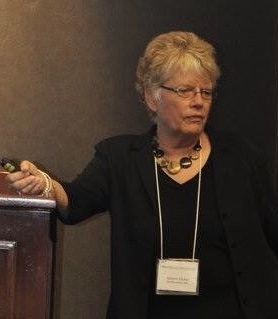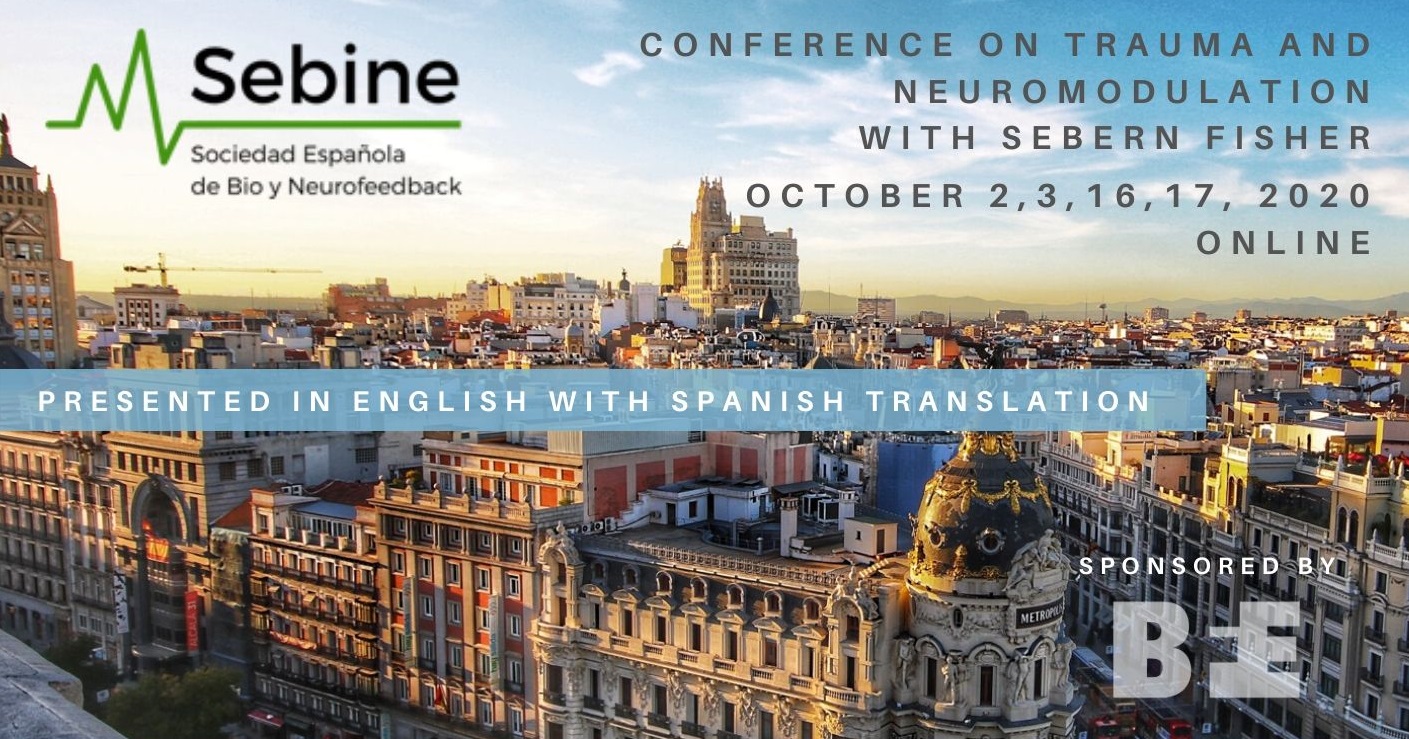SEBINE 2020 Conference on Trauma and Neuromodulation
This event is now closed. Thank you to everyone who attended!
The BFE is proud to sponsor SEBINE’s upcoming Conference on Trauma and Neuromodulation with Sebern Fisher.
Previously scheduled as an on-site event, the online workshop will now take place over four half-days. It will be presented in English (with simultaneous translation to Spanish) making the event ideal for both English and Spanish speakers.
Click below to register for the 2-day program with Sebern Fisher (presented online over 4 half-days):
English
Español
For more information, contact:
Beatriz (bmoralest@gmail.com) or Carol (conferences@bfe.org)
Calming the Fear-Driven Brain: Neurofeedback in the Treatment of Developmental Trauma
Presented by: Sebern Fisher, MA, LMH, BCN
October 2, 2020 – 9:00 am – 1:00 pm (EDT) | 15:00-19:00 (WET)
October 3, 2020 – 9:00 am – 1:00 pm (EDT) | 15:00-19:00 (WET)
October 16, 2020 – 9:00 am – 1:00 pm (EDT) | 15:00-19:00 (WET)
October 17, 2020 – 9:00 am – 1:00 pm (EDT) | 15:00-19:00 (WET)
Cost: 390.00 €
(Special pricing is available for members of biofeedback/neurofeedback associations. Contact conferences@bfe.org for more info.)
This intensive two day seminar (taught over 4 days) is offered for psychotherapists incorporating neurofeedback into their treatment of developmental trauma. We will review the latest neuroscience research relating to the impact of neglect and abuse on the developing brain. No major system seems to be spared. We will look at the brain dynamics underlying dissociation and the differences in how the dissociative and non-dissociative person processes information. These findings challenge our ways of thinking about psychological defenses including dissociation, repression and resistance. They can also inform the development of neurofeedback protocols. We’ll discuss some “tried and true” protocols and some new ones that are emerging in response to the neuroscience. We will discuss how developmental trauma impacts the brain’s networks as well as its capacity to inhibit states of high arousal.
All of these impacts give rise to a mind and sense of identity in our traumatized patients that we encounter as psychotherapists. The second day of this workshop will focus on how to integrate neurofeedback and psychotherapy. We will explore the powerful fields that trauma creates in our patients and in us, where these seem to show up in the EEG and how we can measure change in these fields as treatment and neurofeedback progress. We will discuss the pragmatic issues in the integration of brain and mind approaches such as touch, time and office set-up, as well as the importance of psycho-education in this approach to treatment. And we will explore the changes and the setbacks we can expect to see in the course of recovery from the devastating aftermath of developmental trauma. We will talk about all of this using case examples that the seminar leader and participants bring.
Format: Video, lecture, facilitated discussion
Learning objectives:
Participants will be able to:
- Describe the major effects of neglect and abuse on the developing brain
- Describe atypical brain pathways that underpin dissociation
- Discuss the differences in information processing between those with dissociation and those without.
- Describe how and where developmental trauma impacts networks in the brain
- Discuss the Default Mode, Salience and Executive networks in developmental trauma
- Implement a range of neurofeedback protocols to address developmental trauma
- Discern EEG patterns typical in those with developmental trauma
- Implement the integration of neurofeedback and psychotherapy
- Discuss new ways of thinking about psychological defenses including dissociation, regression and resistance
- Describe the core issue of motherlessness and how we are addressing this with both neurofeedback and psychotherapy
- Speak to the changes we expect to see in-session and in the lives of our patients
- Discuss the central role of affect regulation, particularly regulation of fear, in recovery from developmental trauma
This seminar will be relevant regardless of what neurofeedback or therapeutic approach you use.
Recommended reading: The ACE study (on line or pdf via email) mandatory Recommended reading ( not mandatory):
Neurofeedback in the Treatment of Developmental Trauma: Calming the Fear-Driven Brain- Fisher
The Impact of Early Life Trauma on Health and Disease – Lanius, Vermetten and Pain
The Master and His Emissary- McGilchrist
The Body Keeps the Score- van der Kolk
About Sebern Fisher, MA, LMH, BCN
 Sebern Fisher, MA, LMH, BCN was the clinical director of a residential treatment facility for severely disturbed, severely traumatized adolescents from 1981 to 1997. She brought an understanding of the importance of secure attachment to the center and implemented the first milieu based DBT program in the US. After experiencing profound effects with her own brain, she learned neurofeedback in 1996 and has integrated it with psychotherapy in the treatment of developmental trauma since 1997. She has a private practice in neurofeedback, psychotherapy and consultation in Northampton, Massachusetts and her book, Neurofeedback in the Treatment of Developmental Trauma: Calming the Fear-Driven Brain was released by Norton in 2014 to critical acclaim.
Sebern Fisher, MA, LMH, BCN was the clinical director of a residential treatment facility for severely disturbed, severely traumatized adolescents from 1981 to 1997. She brought an understanding of the importance of secure attachment to the center and implemented the first milieu based DBT program in the US. After experiencing profound effects with her own brain, she learned neurofeedback in 1996 and has integrated it with psychotherapy in the treatment of developmental trauma since 1997. She has a private practice in neurofeedback, psychotherapy and consultation in Northampton, Massachusetts and her book, Neurofeedback in the Treatment of Developmental Trauma: Calming the Fear-Driven Brain was released by Norton in 2014 to critical acclaim.


